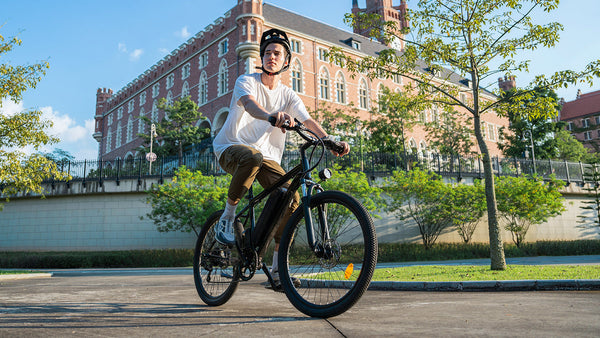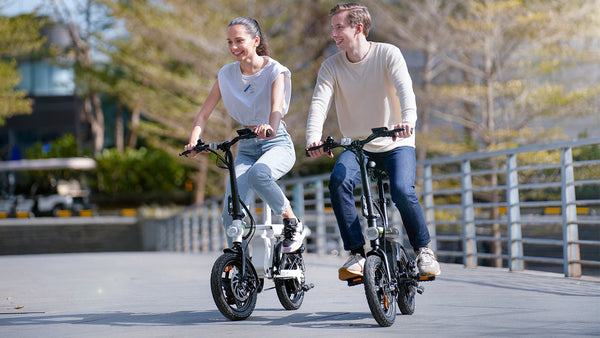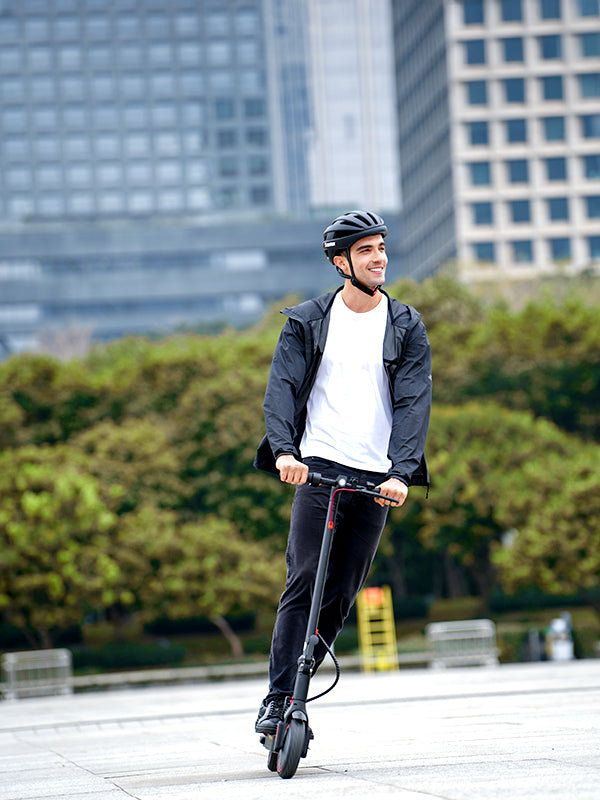
Are Electric Bikes Allowed on UK Trains? Complete Rules, Tips & Guide
Are electric bikes allowed on trains? If you ride an e-bike for commuting, leisure, or adventure, you’ve probably asked yourself this question before planning a journey. The good news is that yes, most UK train operators allow electric bicycles — but the rules can vary depending on the type of bike, the train company, and the time of day you’re travelling. Knowing the policies in advance will save you stress at the station and help you make the most of combining cycling with train travel. In this guide, we’ll break down which e-bikes are permitted, whether you need a reservation, and the key tips for travelling smoothly with your electric bike.
Why You Should Take Your Electric Bike on a Train in the UK?
Convenience for Commuting
Taking your electric bike on the train makes commuting much easier. You can cycle from your home to the station, hop on the train, and then complete the last part of your journey by bike. This not only saves time in traffic but also eliminates the stress of finding parking or dealing with congested city streets.
Exploring New Routes and Destinations
Train travel with an e-bike opens up access to new cycling routes and destinations that might be too far to reach on a bike alone. Whether it’s scenic countryside trails, coastal paths, or vibrant city cycling networks, combining trains and e-bikes allows you to explore more without limiting your adventure to nearby areas.
Sustainability and Eco-Friendly Travel
Using your electric bike with the train is a green travel solution. Trains are one of the most environmentally friendly forms of transport, and pairing them with cycling reduces your carbon footprint further. It’s a practical way to enjoy travel while supporting a sustainable, active lifestyle.
Which Types of Electric Bikes Are Allowed on UK Trains?
Permitted Electric Bikes
Most UK train operators allow certain types of electric bikes, but rules can vary depending on the operator and route. Understanding which bikes are permitted helps ensure a smooth journey without last-minute issues.
Standard-Size Electric Bikes
Full-sized electric bikes, which are similar to traditional push bikes, are generally accepted on most train services. These bikes usually require a reservation, especially on long-distance and intercity trains where bike spaces are limited. Commuters and leisure riders should always check availability in advance to secure a space and avoid delays.
Folding Electric Bikes
Folding electric bikes are compact and lightweight, making them highly flexible for train travel. They often do not require a reservation and can be stored in luggage racks or designated bike areas. Their small size allows passengers to travel during peak hours with minimal restrictions, and they are easier to carry onto the train compared to full-sized e-bikes.
Cargo and Tandem Electric Bikes
Some operators allow cargo and tandem e-bikes, but these are only permitted on specific routes and services. Because of their larger size, these bikes may require advance booking and may only be accepted during off-peak hours. Travellers should always verify operator rules before attempting to board with these types of bikes.
Restricted and Non-Permitted Electric Bikes
Certain motorised or non-standard vehicles are strictly prohibited on UK trains.
E-Scooters
E-scooters are banned from all passenger train services due to safety and size regulations.
Mopeds and Motorcycles
Electric mopeds, motorcycles, and similar motorised vehicles are not permitted on trains, as these pose significant storage and safety challenges.
Non-Folding Bike Trailers
Trailers that cannot fold are generally prohibited, as they are too large to fit safely in bike storage areas and could block aisles or exits.
Folding Electric Bikes on UK Trains: Benefits and Travel Advantages
Folding electric bikes are considered the most travel-friendly choice for UK train journeys, offering convenience, flexibility, and easier storage compared to full-sized e-bikes.
Flexibility and Convenience
Their compact design allows passengers to carry them onto trains without needing a reservation in most cases. This makes them ideal for spontaneous travel or commuting during peak hours.
Easy Storage
Folding e-bikes can be stored in luggage racks or designated areas without taking up a full bike space. Using a protective cover is recommended to keep both the bike and train interior clean.
Peak-Time Exemption
Unlike full-sized e-bikes, folding models are usually exempt from peak-time restrictions, allowing commuters and leisure riders more freedom to travel at any time.
Folding Electric Bikes from iHoverboard UK
For convenient and stress-free train travel, consider folding electric bikes from iHoverboard. The U1 Folding Electric Bike is lightweight and easy to carry, making it perfect for commuters and spontaneous trips. The U4 Low Step-Through Foldable Electric Bike offers a compact design along with a long battery range, providing extra flexibility for longer journeys. Both models are ideal for UK trains, allowing riders to travel efficiently while staying within train regulations and enjoying maximum convenience.
Do You Need a Reservation to Take an Electric Bike on a Train?
Travelling with an electric bike on a UK train often requires planning ahead, as bike reservations are handled differently depending on the type of bike and the train operator. Understanding when and how to reserve your bike ensures a smooth journey without stress.
Full-Sized Electric Bikes
For most full-sized e-bikes, a reservation is compulsory on long-distance and intercity services. These trains typically have limited bike spaces — often between 2 and 6 per service — and without a reservation, you may be refused entry or forced to wait for another train. Reserving in advance is especially important during weekends, holidays, and peak commuting hours.
How to Make a Reservation
Reservations can usually be made through the train operator’s website, ticket app, or at the station. When booking, you will see the available bike spaces and can select the number you need. Once reserved, you may receive a separate bike reservation voucher that must be presented alongside your train ticket.
Folding Electric Bikes
Folding e-bikes are far more flexible and often do not require a reservation because they are considered luggage rather than a full-sized bike. This allows passengers to board trains without planning ahead, though it’s still wise to check the operator’s size limits and peak-time rules.
Storage and Safety
Even without a reservation, folding e-bikes must be stored safely in luggage areas. Using a protective cover helps prevent damage to both the bike and the train interior. Removing the battery can also make the bike easier to handle and reduces the risk of theft.
Example Operator Policies
Different train companies have slightly varying rules:
-
Avanti West Coast: Reservations are compulsory on all services; up to 4 bike spaces per train.
-
ScotRail: Some routes operate a first-come, first-served policy, while others require booking.
-
LNER: Reservations available for most long-distance trains; no fixed restrictions on folding bikes.
-
Great Western Railway (GWR): Reservations recommended during peak hours; folding bikes generally do not need booking.
By understanding the rules for each operator and type of e-bike, travellers can plan their journey confidently and avoid last-minute surprises at the station.
Electric Bike Peak-Time Restrictions on UK Trains
Standard Peak Hours
Most UK train operators have peak-time restrictions for carrying full-sized electric bikes. These typically apply during commuter rush hours, Monday to Friday, in the mornings and evenings. For example, trains arriving in London between 07:00 and 10:00 and departing between 16:00 and 19:00 are often restricted for bikes, as these services experience high passenger volumes. Travelling outside these times reduces the risk of being refused boarding due to limited bike spaces.
Folding Electric Bike Exemptions
Folding electric bikes are generally exempt from peak-time restrictions, making them a more flexible option for commuters and leisure riders. Because they are considered luggage rather than full-sized bikes, folding e-bikes can usually be carried on trains during busy hours without needing a reservation or special permission. This flexibility is one of the key advantages of owning a folding e-bike for train travel.
Operator Variations
Peak-time rules vary depending on the train operator and route. For instance, Great Western Railway (GWR) restricts full-sized bikes on certain services arriving at or leaving London Paddington during peak hours, while South Western Railway enforces similar restrictions on trains into London Waterloo. Other operators, like ScotRail or CrossCountry, may have first-come, first-served policies, or allow booking in advance for peak services. Always check the specific operator’s website before travelling to avoid issues with bike boarding.
Taking Electric Bikes on Rail Replacement Buses in the UK
Sometimes trains are cancelled, delayed, or replaced with bus services due to engineering work or unexpected disruptions. In these cases, the rules for carrying electric bikes are stricter, so it’s important to know what’s allowed to avoid complications during your journey.
Folding Electric Bikes
Folding e-bikes are generally the only type of electric bike permitted on rail replacement buses. Their compact size and lightweight design make them easy to carry and store safely on buses, even when space is limited. Travellers with folding e-bikes can usually continue their journey without interruption, making them the most flexible option in case of service disruptions.
Non-Folding Electric Bikes
Full-sized, non-folding electric bikes are usually not allowed on replacement buses. If your train is replaced by a bus, you may be left with no alternative but to cycle the distance yourself. This restriction highlights the importance of checking operator policies and considering folding e-bikes if you frequently rely on trains for commuting or leisure travel.
Best Option for Regular Users
For commuters or regular train users, folding electric bikes are the most reliable choice. They provide peace of mind during disruptions, as they can be taken on most rail replacement services without issue. Investing in a folding e-bike ensures your journey can continue smoothly, even if your train is cancelled or replaced, while avoiding the stress and limitations associated with full-sized e-bikes.
Electric Bike Travel on London Trains: TfL Rules and Guidelines
TfL Electric Bike Rules from 31 March 2025
Transport for London (TfL) introduced new rules from 31 March 2025 that affect electric bike travel across the city’s train networks. Under these rules, non-folding e-bikes are no longer permitted on the Tube, London Overground, Elizabeth line, and the DLR. This change was implemented to improve safety and manage space on busy commuter trains.
Folding electric bikes, however, are still allowed on most TfL services, making them the preferred choice for city commuters and leisure riders. While folding e-bikes can usually be taken on trains, passengers should note that bus drivers and train staff may refuse entry if the service is too crowded, so planning travel outside peak hours is advisable. Folding e-bikes offer the most flexibility for navigating London’s public transport while complying with these new regulations.
On-Train Rules and Tips for Traveling with Electric Bikes in the UK
Arrive Early When Traveling with Electric Bikes on Trains
Arriving at the station at least 15–20 minutes before departure is essential when travelling with an electric bike. Early arrival allows you to locate the designated bike storage areas, confirm which carriage has reserved bike spaces, and secure a spot without rushing. This is especially important on busy services or during peak hours.
Remove Your Electric Bike Battery for Easier Train Travel
For easier handling and added security, it’s recommended to remove the battery from your electric bike before boarding. A lighter bike is easier to lift onto racks, and removing the battery reduces the risk of theft while the bike is in storage.
Electric Bike Charging Rules on UK Trains
Most UK train operators do not permit charging e-bike batteries on board. Passengers should ensure their battery is fully charged before travel and avoid attempting to plug in while on the train, both for safety and to comply with operator rules.
Storing Folding Electric Bikes on Trains
If you’re travelling with a folding electric bike, check operator-specific rules, as some may require the bike to be stored in a protective cover. Covering your bike helps prevent damage to the train interior and protects your bike from scratches or grease while in luggage racks.
How to Secure Your Electric Bike on a Train
Whenever possible, secure your bike using a lock, especially in busy or long-distance services. Removing panniers and accessories not only makes handling easier but also reduces the risk of theft or damage. Properly securing your bike ensures a safer, smoother journey for both you and other passengers.
How to Protect Your Electric Bike on UK Trains
Travelling with your electric bike on a train is convenient, but it’s important to take steps to protect your bike and ensure it remains safe throughout the journey.
Remove Panniers and Accessories from Your Electric Bike Before Train Travel
Before boarding, remove panniers, bags, and any detachable accessories from your bike. This not only makes the bike easier to lift and manoeuvre into storage areas, but it also reduces the risk of theft or damage to your belongings while on the train.
Use a Protective Cover for Folding and Non-Folding Electric Bikes on Trains
For folding electric bikes, it’s highly recommended to use a protective cover. Covers prevent chain grease or dirt from contacting train interiors and protect your bike from scratches or bumps while stored in luggage racks. Even for non-folding bikes, a cover can offer extra protection if space is tight.
Secure Your Electric Bike to Train Racks with a Lock
Wherever possible, secure your bike to the available racks using a lock. Locking your bike adds an extra layer of security, particularly on long-distance or busy services, and helps prevent theft while the train is in motion or when unattended.
Remove Your Electric Bike Battery for Safety and Easier Handling on Trains
Removing the battery from your electric bike makes it lighter and easier to handle, especially when lifting or storing it on the train. Additionally, a removed battery is less attractive to potential thieves, further protecting your investment during travel.
Conclusion
Yes, electric bikes are allowed on trains in the UK, but the rules and conditions depend on factors such as the bike type, train operator, and peak-time restrictions. Full-sized e-bikes often require reservations and may be restricted during busy commuter hours, while folding e-bikes provide greater flexibility and can usually be carried on trains without limitations.
Before travelling, it’s always important to check the specific policies of your train operator, including bike reservation requirements, storage rules, and any local restrictions, especially if you plan to travel on London transport networks.
For commuters and leisure riders alike, folding electric bikes are the most convenient option, offering the freedom to travel across the UK by train while avoiding restrictions, ensuring a smoother, stress-free journey, and making it easier to explore new routes and destinations sustainably.
FAQs
Can you bring an e-bike on a train?
Yes, you can bring an electric bike on most trains in the UK, but there are some important rules to follow. Standard-sized e-bikes usually require a reservation, and some trains may restrict travel during peak commuter hours. Folding electric bikes are much more flexible—they can often be carried without a reservation and are exempt from peak-time restrictions. Always check your train operator’s policy before travelling to ensure a smooth journey.
Why are e-scooters banned on trains but not e-bikes?
E-scooters, along with hoverboards and electric skateboards, are not allowed on UK trains due to safety concerns, battery risks, and their potential to block aisles or cause accidents. In contrast, electric bikes are generally permitted because they are more stable, designed for road use, and can be safely stored in bike racks or luggage areas. While e-bikes still have size and reservation restrictions, they meet the safety and operational requirements set by train operators, which is why they are allowed on most services.
Can you take an electric bike on a bus in the UK?
In most cases, you cannot take a full-sized electric bike on UK buses, including rail replacement services, due to space and safety restrictions. Only folding electric bikes are generally permitted, as their compact design allows them to fit in luggage areas without obstructing other passengers. If you plan to travel with your e-bike by bus, check the operator’s policy in advance to avoid any issues during your journey.
Is it legal to ride an e-bike on the pavement?
No, it is illegal to ride an electric bike on pavements in the UK. E-bikes are classified as bicycles under UK law, and cycling on the pavement is considered an offence unless you are in a designated shared-use area. Riding on pavements can result in fines or penalty points, so it’s important to stick to roads, cycle lanes, and designated paths when using your e-bike.
Product Category
Recent Posts

Best Long-Range Electric Bikes in the UK – Go Further with E‑Bikes from iHoverboard

Best Ladies Electric Bike: Top iHoverboard Models Under £1000

How to Reset Your Electric Bike Battery – Simple Methods to Fix Common Issues

How Much Does It Cost to Charge an Electric Bike in the UK? Real Costs, Savings & Tips



























































Still, need help? Contact Us: support@ihoverboard.com
What's the option? Check out the option now!
Leave us a message